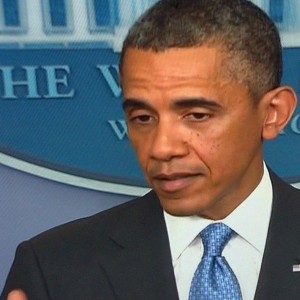I know the presser is a 100-day marker. But the WHCD was such a stark contrast. It’s definitely back to the somber stuff today. Brief mention of the WHCD at the start, but Syria is the lead. Obama still unclear on what the U.S. should do. And even support efforts announced today seem to be a token gesture. A delicate fluid situation.
President was more clear on the sequester and defining the dysfunctional government and putting blame on Congress and its failure to do its job.
“It’s not my job to get them to behave,” said the president.

Obama’s example of the FAA instance exposed the short-sighted nature of the GOP. All it’s done is borrow money from airport improvements in the future, which hurts the U.S. long term. Obama said the best strategy is to address issues through a broader deal.
Obama mentioned a “permission structure,” that may allow those scared of their political base to reach compromise on budget issues.
It was as blunt and detailed an answer, of the conseqeunces of sequester and how it has hurt the country. No pussyfooting here.
“We are using our seed corn, short term.And the only reason we’re doing it is because right now we have some folks unwilling to make some simple changes to our tax code, for example to close loopholes that aren’t adding to our competitiveness and aren’t helping middle-class families,” said the president. “There are common sense solutions to our problems right now. I cannot force Republicans to embrace those common sense solutions. I can urge them to, I can put pressure on them, I can rally the American people around those common sense solutions. But ultimately they themselves are going to have to say we want to do the right thing.”
The president indicated he understood Congress’ political dilemma. “It’s tough,” he said. “Their base thinks that compromise with me is somehow a betrayal. They’re worried about primaries. And I understand all that, and we’re going to do everything we can to create a permission structure for them to do what’s best for the country. But it’s going to take some time.”
Permission structure? Does he mean political cover so that conservatives can hide behind a tough vote?
The president also weighed in on what is could be the signature accomplishment of this term: Immigration.
The president praised the Gang of Eight’s efforts, saying it may not have been what he would have done, but it did meet the criteria: Border safety, strong employer provisions, improvements to the current bureaucracy, and that pathway to citizenship.
Obama praised the pathway as one where people can earn the right to legalize their status over time.
But that’s one of the contentious issues in the plan.
Obama said he’s open-minded. He’ll need to be. Already some House members have said they don’t want a big package but would rather take up the issue piece meal.
Sound precarious? It is. And this is the President’s best issue going forward.
Obama was almost out the door when he came back to the podium to discuss Jason Collins’ coming out statement.
Said the President:
“Yeah, I’ll say something about Jason Collins. I had a chance to talk to him yesterday. He seems like a terrific young man, and, you know, I told him I couldn’t be prouder of him. You know, one of the extraordinary measures of progress that we’ve seen in this country has been the recognition that the LGBT community deserves full equality, not just partial equality, not just tolerance but a recognition that they’re fully a part of the American family.
And, you know, given the importance of sports in our society, for an individual who’s excelled at the highest levels in one of major sports go ahead and say, this is who I am, I’m proud of it, I’m still a great competitor, I’m still seven feet tall and can bang with Shaq and, you know, deliver a hard foul — and for, you know, a lot of young people out there who, you know, are — are — are, you know, gay or lesbian, who are struggling with these issues, to see a role model like that who’s unafraid, I think it’s a great thing. And I think America should be proud that this is just one more step in this ongoing recognition that we treat everybody fairly. And everybody’s part of a — part of a family, and we judge people on the basis of their character and their performance, and not their sexual orientation.”
That was a question the president was glad to answer.
See my latest at the Asian American Legal Defense and Education Fund blog.
